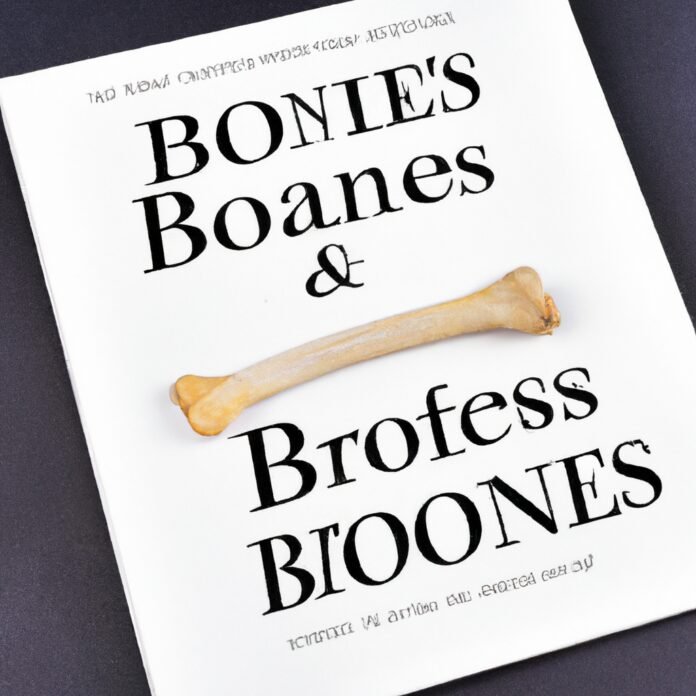Women’s bodies have a unique structure that ironically makes them particularly vulnerable to fractures and bone-related diseases. As we age, our bones naturally become more fragile and prone to diseases like osteoporosis. Although it may be impossible to prevent bone problems associated with old age, there are a number of preventive measures we can take to ensure our bones stay strong and healthy – for life! In this article, we’ll discuss exactly how to keep our bones healthy and how to prevent the onset of osteoporosis. Read on to learn all about bone health for women and how to make sure your bones stay strong!
1. The Importance of Bone Health for Women
As women age, the health of their bones plays a crucial role in quality of life. A decline in bone health can cause issues such as osteoporosis and ultimately lead to pain, fractures, and a decrease in independence. For these reasons, it is important that women understand the consequences of poor bone health and focus on preventative means to maintain or improve their bone density.
The most important thing a woman can do is to ensure that she is getting enough calcium and vitamin D. Calcium is a building block for bones and vitamin D assists in the absorption of the calcium. A balanced diet is key to achieving the necessary amounts of calcium and vitamin D, but in some cases, supplements may be necessary to reach the recommended dose. A doctor can help identify the right combination of supplements for each individual.
In addition to dietary changes, physical activity is also important. Not only does exercise help maintain a healthy body weight, reduce stress levels and improve heart health, it also helps keep bones strong. Weight-bearing activities like walking, jogging, dancing and climbing stairs support bone health. Stronger muscles help absorb shock and decrease the risk of fractures from falls.
Being aware of potential risk factors can help women understand their potential conditions, and make necessary lifestyle changes. Risk factors to consider include age, smoking, alcohol consumption, family history, and physical inactivity. If women have two or more of the risk factors, they should discuss their concerns with their doctor. There are also blood tests that measure a woman’s bone density.
- Most important: Ensure enough calcium and vitamin D are consumed.
- Physical activity: Weight-bearing activities like walking, jogging, dancing and climbing stairs.
- Consider risk factors: Age, smoking, alcohol consumption, family history, and physical inactivity.
2. Building Bones for a Strong Foundation
Bones are the foundation that the whole of a healthy body is built upon. Without strong bones, it becomes increasingly difficult to keep a healthy lifestyle. After all, they’re the ones that give us the strength and flexibility needed to perform everyday tasks.
- Calcium – Calcium is the most important mineral to focus on when building strong bones. Dairy, fortified non-dairy milks, and leafy greens are all great sources of calcium and should be included in a balanced diet.
- Protein – Protein needs to be consumed daily to ensure that your bones have a solid base to stand on. Lean meats, nuts and seeds, and legumes are all excellent sources of protein.
- Vitamin D – Vitamin D is essential for helping your body absorb the calcium you eat in your diet. The best way to get Vitamin D is by spending time outside and soaking up the sun.
Regular physical activity is also key when it comes to maintaining bone health. Not only does exercise help keep bones strong, but it also helps body weight remain in a healthy range and helps reduce the risk of injuries.
Following a diet that is rich in calcium, protein, Vitamin D, and including regular physical activity in the day can be the key to a strong, healthy foundation of bones to build on. Make sure you are protecting your body with the essentials and everything it needs to stay in great shape.
3. Strategies to Prevent Osteoporosis
To prevent osteoporosis, it’s important to take preventive measures at all stages of life. Here are a few strategies you can use to start building strong bones:
- Exercise – Increase your physical activity to help strengthen your bones. Weight-bearing exercises, such as running, climbing stairs, aerobics, and dancing, will do the trick. Additionally, muscle strengthening exercises like lifting weights can maintain your bone’s density.
- Diet – Food plays a key role in healthy bones. A diet rich in calcium, vitamin D, and other essential minerals, such as magnesium, zinc, and phosphorous, is important. Try to include foods such as dairy products, fortified cereals and oatmeal, fruits and vegetables, and nuts and seeds.
- Supplements – To supplement your diet, take a calcium supplement with vitamin D. This combination helps your body absorb the calcium and use it where it’s needed. Talk to your doctor about appropriate supplements for your age and stage of life.
Additionally, lifestyle habits, such as reducing your alcohol intake, quitting smoking, and avoiding steroid medications, also help prevent bone loss. Finally, it’s important to get enough sleep and limit stress, as both have an effect on bone health.
Start implementing these strategies today to help keep your bones healthy and strong. Together they can help protect against osteoporosis and the risks associated with it.
4. Regular Exercise Routines for Optimal Bone Health
Walking
Walking is an easy exercise without needing any special equipment. On a flat terrain at a moderate pace, the intensity of a walk is comparable to the stiffness of bones in the lower extremities. Walking helps to increase bone mass and density, which is essential for healthy bones. It is recommended to take at least a 30-minute walk at least 3 times a week.
Yoga
Yoga is a popular exercise that has been practiced for thousands of years. Consistent practice of yoga helps to improve bone health by increasing flexibility, muscle strength, and joint stability. In yoga, breath is connected with physical movements that help you build strength and maintain balance. With proper yoga practice, the risk of fractures and osteoporosis can be greatly reduced.
Weight-Bearing Exercises
Weight-bearing exercises help to strengthen bone mass of the body. This can be in the form of lifting weights, using exercise machines, walking or running up stairs, and jumping. Weight-bearing exercises require little to no equipment and can be tailored to anyone’s fitness level and goals. The effort of the exercise should be at a level of being able to complete 10-15 repetitions with little to no strain.
Exercises for Balance
Having healthy bones includes having good balance. Doing exercises to improve balance, such as standing on one leg or walking heel-to-toe, can help to prevent falls and reduce the risk of broken bones and osteoporosis. Other activities can include standing on a balance board or using a wobble cushion to challenge your balance. Start with basic exercises that become more complicated as your balance improves.
5. Nutritional Recommendations for Healthy Bones
Maintaining bone health is an important part of overall wellbeing. Here are five nutritional tips to help keep your bones strong:
- Include plenty of calcium-rich foods. Dairy products, kale, broccoli, and other dark leafy greens, and fortified foods like almond or soy milk are all good sources of calcium.
- Eat plenty of Vitamin D-rich foods. These include salmon, mushrooms, and fortified breakfast cereals. Your body needs Vitamin D to absorb calcium, so get out in the sunshine too!
- Consume more magnesium-rich foods. Legumes, whole grains, Swiss chard, and dark chocolate are all healthy sources of magnesium.
Including vitamins and minerals is important for bone health, but don’t forget about proteins. Protein helps build and maintain strong bones, so make sure to eat plenty of lean meats, eggs, and pulses. It’s also a good idea to cut down on alcohol and caffeine, as they can interfere with your body’s ability to absorb calcium.
Finally, don’t forget to stay active. Weight-bearing exercises like running, dancing, and regular strength training can help keep your bones strong by improving the density of your bone tissue. And of course, eating a balanced diet full of the nutrients listed above will ensure that your bones have everything they need to stay healthy.
Women need to take proactive measures to care for their bones to ensure their lifelong health and wellbeing. By understanding the types of food to eat, engaging in physical activity, and understanding risk factors, you can take proactive steps to ensure your bones stay strong and robust. With the right knowledge and proactive measures, you can keep your bones healthy and strong throughout your life.

